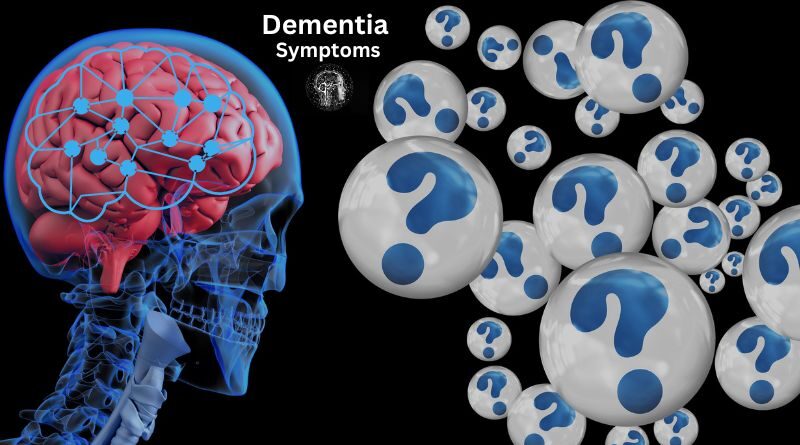Dementia Symptoms: What is Dementia and what are the Stages?
Dementia symptoms occur when brain cells die or become damaged and stop working as they should. The brain regions that control memory, thinking, judgment, speech, language, vision, movement, and problem-solving deteriorate as dementia progresses. Dementia refers to the symptoms of memory loss and other cognitive problems caused by disorders of the brain. Dementia can be mild, moderate, or severe and may be temporary or permanent depending on the type of dementia and stage of progression.
What is Dementia?
Dementia has become more prevalent in recent years. This can be attributed to many factors such as improved healthcare, greater access to medical attention, better diets, and a more active lifestyle. Dementia is not just memory loss, but a variety of other symptoms that worsen over time. There are two major types of dementia, vascular dementia, and Alzheimer’s disease.
There is no one test for Alzheimer’s so it can be difficult to diagnose which type someone has. A doctor will perform several tests in order to come up with an educated guess. All forms of dementia get worse over time so it is important that loved ones know how best to care for their family member as they progress through each stage of this disease.
What Are the Stages of Dementia?
Though dementia symptoms can vary, there are four stages of dementia to understand. These four stages, in chronological order, are as follows: early mild dementia (MMSE score between 20-24), middle moderate dementia (MMSE score of 15-19), late moderate dementia (MMSE score of 10-14), and very late stage Alzheimer’s disease. The MMSE measures how well a person functions on 10 different tasks, such as remembering an item from a list or naming something that begins with a certain letter.
With this measure, doctors can determine what stage of dementia a patient has reached.
The first three stages focus more on memory and the ability to recall things while the fourth focuses more on mental capacity like planning, problem-solving, judgment skills, etc. There is no cure for dementia but patients in these first three stages may be able to continue working and lead a semi-normal life while those at the final stage need 24/7 care from someone else because they cannot take care of themselves at all.
Getting Diagnosed with Alzheimer’s Disease
Alzheimer’s Disease ̶ a type of dementia that causes Alzheimer’s Disease symptoms ̶ can be hard to diagnose. Some factors that affect getting an accurate diagnosis include whether you have a family history of Alzheimer’s, your age, and when you had your first symptoms. Though it can be difficult, knowing what to expect from the diagnostic process can help.
Your doctor will start by asking you questions about your medical history, including any family history of dementia or Alzheimer’s. Then they’ll examine you for physical issues that could be causing your symptoms. They may also perform tests like a blood test or imaging scan to rule out other health problems with similar symptoms as well as ask you to complete certain tests, such as memory exercises, to evaluate whether you have signs of Alzheimer’s Disease.
Your doctor will check with their colleagues if they have concerns about your diagnosis or need more information before making a final decision. It can take up to two years from first showing symptoms until receiving an official diagnosis ̶ however in rare cases it can take longer than two years.
Is There a Cure for Alzheimer’s Disease or Other Forms of Dementia?
There’s no cure for Alzheimer’s Disease or other forms of dementia, but there are plenty of treatments that can make your life easier. One thing to keep in mind is that people who are cognitively impaired aren’t the only ones that suffer from Alzheimer’s Disease or other forms of dementia, so it’s important to know what you’re getting into before you do anything.
There are a lot of different symptoms, stages, types, causes…and more. Some people find a balance between two extremes- staying at home with loved ones while accepting help as needed. That may mean caregivers come every day to help with cooking and cleaning or maybe just a little food shopping every now and then.
Types of Dementia
Many people wonder what is dementia? However, it can be difficult to tell what exactly dementia symptoms mean. People experience different types of dementia, so it’s important to recognize the early signs of these forms to diagnose and provide treatment for them. The types of dementia include Alzheimer’s disease, vascular dementia, frontotemporal lobar degeneration (FTLD), Lewy body disease (LBD), multi-infarct dementia (MID), Creutzfeldt-Jakob disease (CJD)*, and chronic traumatic encephalopathy.
Prevention Tips to Reduce Your Risk of Memory Loss
Most of us worry about cancer, heart disease, diabetes, or stroke. But did you know that dementia is a very real risk for nearly everyone who reaches an advanced age? You can take preventive steps to keep your brain as healthy as possible. For example, reducing your risk of memory loss by taking care of your body can be part of that process. Some additional tips you might want to consider are avoiding smoking and excessive drinking and eating healthy foods.
Outliving Your Memory Problems
Another word for dementia is cognitive decline, which means your ability to think or remember declines. This can happen quickly or slowly depending on what causes it. Dementia symptoms usually start with memory problems, such as forgetting recent events or where you put things. That’s because dementia affects parts of the brain that control these skills. As dementia gets worse, you may experience more confusion and changes in personality and behavior.
Plus One Tip from What Are Some Tips to Prevent Memory Loss: It’s also important to reduce other risks like depression, which is common in people with dementia. Exercise has been shown to have benefits too!
How Is Memory Loss Treated?
Memory loss can be treated in many ways, ranging from lifestyle changes to medicines. The first step to treating memory loss is to identify which type of dementia the person has been diagnosed with. In Alzheimer’s disease, for example, there are medications that can be prescribed that may temporarily slow down memory decline or prevent dementia from worsening. People diagnosed with other types of dementia may not have access to these medications, but in all cases, treating memory loss requires understanding how it affects a person and how they can manage their symptoms best.
For more information about Health & Medical Feild keep browsing Blogs Gurru




